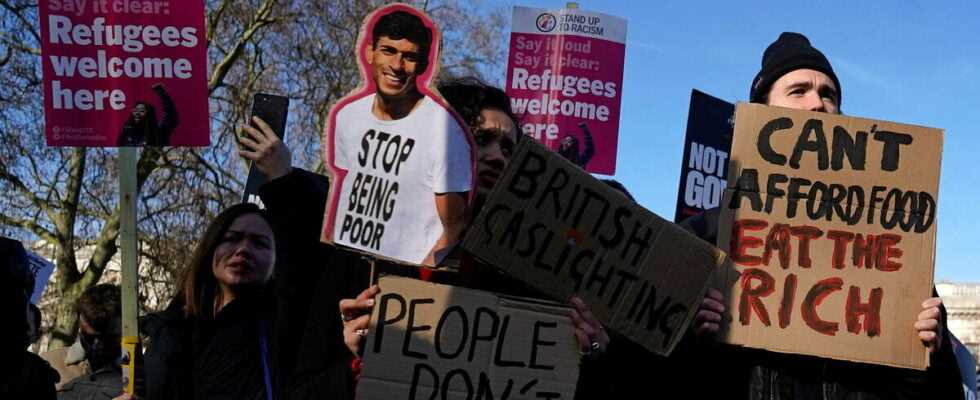In London, but also in Glasgow or Cardiff, it is the same watchword: demonstrate to denounce the soaring cost of living. This Saturday, hundreds of demonstrators marched in the United Kingdom to denounce an economic and social situation which is strangling low-income households.
In the English capital, protesters marched behind a black banner calling for “lower energy bills” while another sign called for “freeze prices, not the poor”in reference to the increase in these bills which lead low-income households to give up heating.
Several placards also demanded the departure of Conservative Prime Minister Boris Johnson, proclaiming “the Tories, out“. Former Labor Party leader Jeremy Corbyn was present among the crowd of protesters gathered at the call of the anti-austerity movement People’s Assembly, supported by several unions.
Other demonstrations also took place in the rest of the United Kingdom, from Glasgow in Scotland to Cardiff in Wales via Manchester located in the north of England. “Maybe if you saved up on the wine and cheese it would help me keep the light on,” could we still read on a placard held by a demonstrator in Glasgow. A direct reference to the parties organized in Downing Street despite the restrictions against the Covid-19, which caused a scandal and melted like snow in the sun the popularity of Boris Johnson.
One in eight workers struggle to pay for basic necessities
“The working classes should not pay for a crisis they did not create,” declared on Twitter Laura Pidcock, national secretary of People’s Assembly. Why such demonstrations? For months, low-income workers in the UK have faced a “exceptionally difficult period” because of a surge in the cost of living, alerted the British trade union federation TUC on Monday.
A report drawn up by this same federation shows that the number of workers benefiting from minimum income (“universal credit”) has increased by 1.3 million people compared to the situation which prevailed before the pandemic. A TUC survey of 2,200 workers shows that one in eight workers say he or she will face difficulty managing to pay for basic necessities in the coming months.
For its part, the Bank of England has warned that inflation, already at its highest in 30 years at 5.4% in the United Kingdom at the end of 2021, could climb to 7.25% by April. Inflation which should not return to normal levels within two years. Faced with runaway energy prices which weigh heavily on the budget of British households, the British government had nevertheless tried to calm its constituents. Ten days ago, a 9 billion pound aid plan was unveiled. An envelope immediately deemed insufficient and poorly targeted by the opposition and NGOs.
